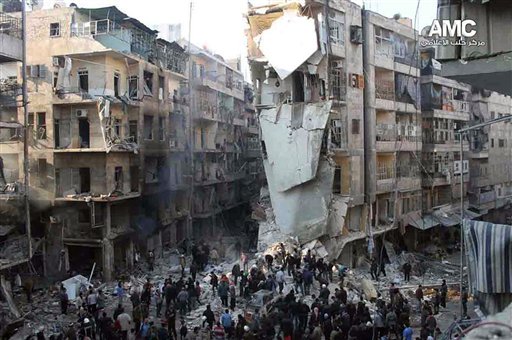(AP) UN finds systematic disappearances in Syria
By JOHN HEILPRIN and BARBARA SURK
Associated Press
GENEVA
A U.N. panel probing war crimes in Syria reported Thursday that people around the country are systematically vanishing without a trace as part of a widespread campaign of terror against civilians.
The expert panel said it found “a consistent country-wide pattern” of Syrian security, armed forces and pro-government militia seizing people in mass arrests or house searches and at checkpoints and hospitals, then making them disappear _ and denying that they even exist. Most of the victims have been young men.
Among the cases were a 60-year-old woman put in Homs prison for asking about her missing son, and a peaceful protester’s brother taken in a house raid by political security agents.
An air force defector has described orders not to provide information about the whereabouts of detainees or to speak to their relatives, the report said.
The four experts’ report said that rebel groups such as the al-Qaida-linked Islamic State in Iraq and the Levant that control large parts of northern Syria also have begun seizing people and running secret prisons.
It said the opposition’s abductions of human rights advocates, journalists, activists, humanitarian workers, religious leaders and perceived supporters of President Bashar Assad’s government usually differ because the victims tend to be taken as hostages for ransom or prisoner exchanges, and their existence isn’t concealed. However in recent months the groups have also begun adopting the government’s practice of making people vanish.
Amnesty International also reported Thursday, based on interviews with former detainees, that the Islamic State in Iraq and the Levant has “ruthlessly flouted the rights of local people” at secret prisons in northern Syria at which torture and summary killings are common.
In an 18-page report, the Britain-based watchdog said children as young as eight are held along with adults in seven ISIL-run detention facilities in Syria’s Aleppo and Raqqa provinces. Many are held for challenging ISIL’s rule, crimes like theft or for committing purported “crimes against Islam” such as smoking cigarettes.
The disappearances are “part of a widespread campaign of terror against the civilian population,” and amount to a crime against humanity, reported the U.N. Syria war crimes panel, chaired by Brazilian diplomat and scholar Paulo Sergio Pinheiro. The panel pressed Syria’s government to provide information and called on both sides to stop the practice.
Syrian human rights monitors have said the number of those gone without a trace is in the thousands and the targets often are doctors, aid workers, lawyers and other peaceful regime opponents.
The U.N. panel doesn’t quantify the phenomenon, but says the accounts it has received “only hint at the scope of the crisis … and the state of fear in which ordinary citizens live.”
The allegations from the U.N. panel and Amnesty International came just hours after the U.N. General Assembly approved a resolution expressing outrage at “widespread and systematic gross violations” by Syrian authorities. The resolution was initiated by Saudi Arabia on behalf of dozens of countries, including the United States.
While General Assembly resolutions are not legally binding, they offer a strong expression of world opinion. Nearly three years of fighting between Syrian troops and opposition forces has killed more than 120,000 people.
In Damascus, Syrian Deputy Foreign Minister Faysal Mikdad blasted the United Nations, telling Syrian state TV that the world body’s role in the crisis is “disgraceful.”
Mikdad also criticized Western countries, saying that while they criticize Damascus they remain silent about crimes committed by the rebels, including the recent killing of some 100 people by opposition forces in the Damascus suburb of Adra last week.
The U.N. report on disappearances notes that in recent months, anti-government armed groups have begun using the tactic, an “extremely worrying phenomenon which has affected many thousands of family members who simply don’t know the fate of their loved ones.”
In northern Syria, government war planes have bombed rebel-held districts of Aleppo for the fifth straight day, leveling apartment buildings, flooding hospitals with casualties and killing nearly 200 people, activists said.
The Britain-based Syrian Observatory for Human Rights reported fresh round of airstrikes on Thursday, saying Assad’s jets hit Aleppo’s two opposition-controlled districts. It said there were casualties, but gave no number.
The Observatory has been tracking the conflict since it started in March 2011. It relies on a network of activists on ground.
___
Surk reported from Beirut. Associated Press Writer Albert Aji in Damascus, Syria, contributed to this report.

COMMENTS
Please let us know if you're having issues with commenting.